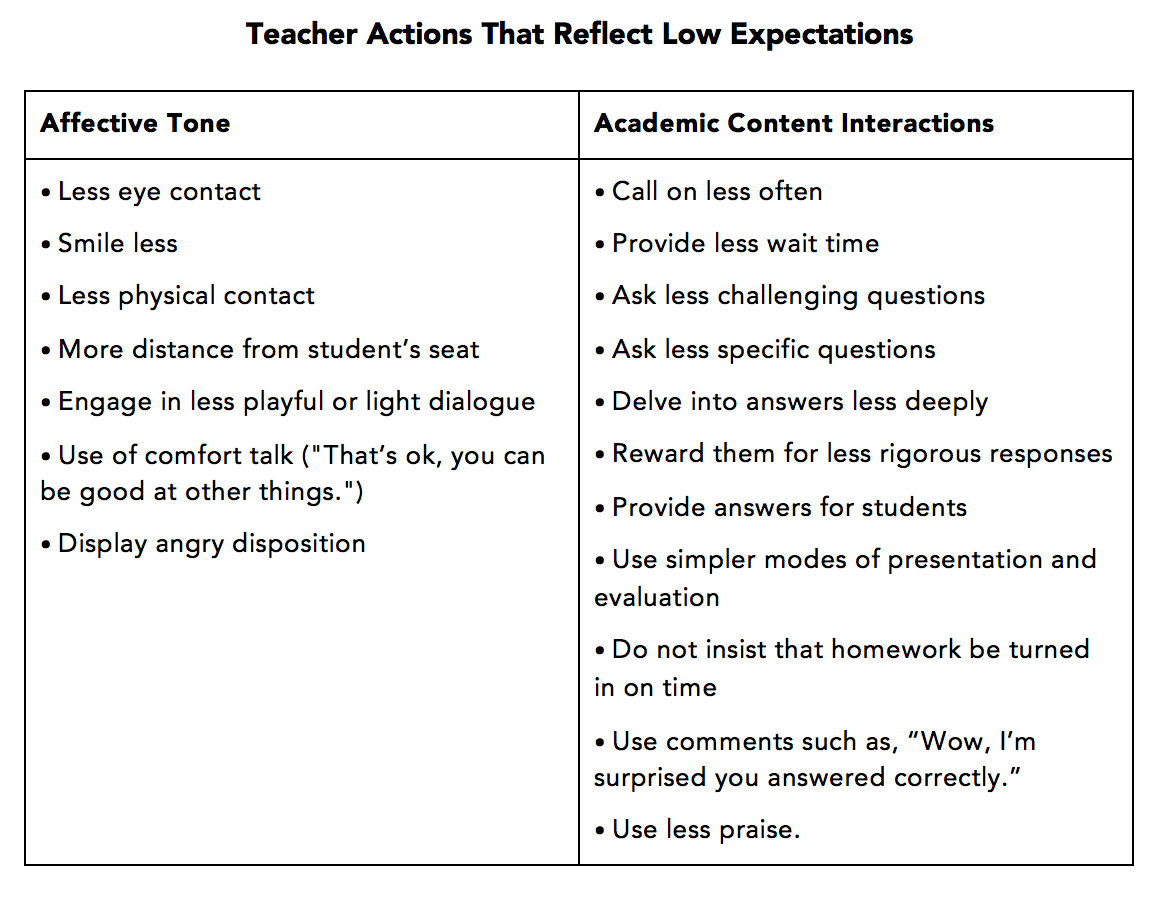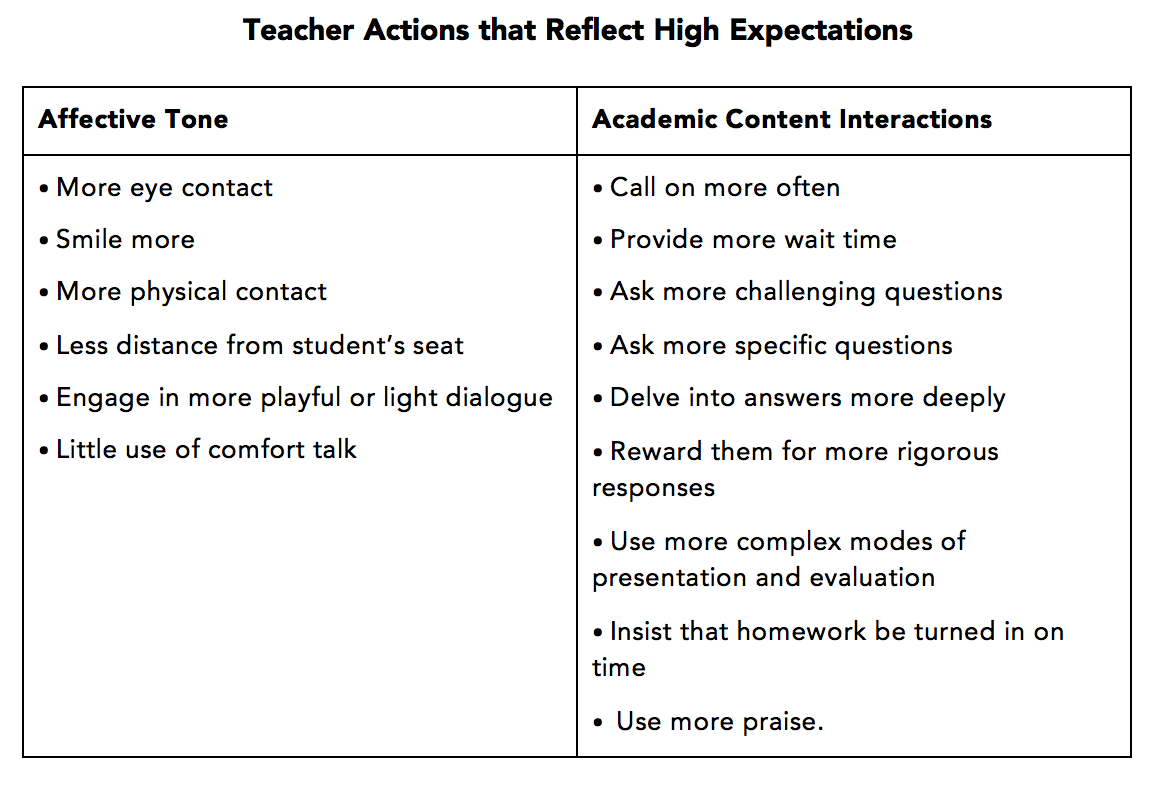 By Barbara Blackburn
By Barbara Blackburn
Do you have high expectations for your students? I’ve never met a teacher who said, “I have low expectations for my students.” The challenge is that we sometimes have hidden low expectations of certain students.
One year, early in my teaching career, several teachers “warned” me about Daniel, a new student in my room. During class, he certainly lived up to (really down to) the teachers’ comments. Despite my efforts, my expectations for him became lower, with the words “They warned me” echoing in the back of my mind.
Right from the start, no matter what anyone tells us, we have to be on guard to ensure that we keep high expectations in place for every single student.
Our behaviors speak loudest
Of course we may believe in high expectations for all the kids in our classroom but not translate those expectations into actions that support our beliefs. Instead, our actions may inadvertently undermine high expectations for all. When this happens, you can be sure students are quick to notice.
Robert Marzano has spent decades researching effective teaching practice. He and others have found that when we have high expectations, we treat students differently. When questioning students, we call on them more often, ask more challenging questions, provide more wait time, and probe for additional information.
How often do we fail to use these same strategies with struggling learners?
I know I made that mistake as a new teacher. Quinn struggled in my class, and nothing I did seemed to work. I ended up putting him in the last row of my classroom. As long as he behaved, I didn’t call on him or push him to participate.
Even though I said I expected all my students to learn, I didn’t really show that to Quinn. And he understood my message. One day, we talked about his performance in my class, and he said, “Why should I try? You don’t think I can do anything.”
That was an eye-opener for me. I was so focused on making sure he behaved and didn’t interrupt the learning flow that I didn’t challenge him. I was content to let him be a passive learner. My actions reflected subconscious low expectations.
The problem isn’t that we do not care
Another year, I had a similar situation with Clarissa. She was bright but had no confidence in her ability to excel. Her lack of self-efficacy caused her tremendous learning problems. She wasn’t willing to try to learn anything new or challenging.
I wanted to boost her confidence, so I provided easier work for her to complete. Instead of multi-step math problems, I gave her single-step problems. When we were reading, I allowed her to read easier books, many of which she had read before. I wanted her to feel successful.
I cared about her, but what I didn’t realize was that I wasn’t doing my job. I wasn’t teaching her to learn and grow—I was content to leave her in her comfort zone. By doing so, I also showed her I didn’t think she could do any better.
Once again, despite my comments to her that she could learn and that I had high expectations for her, my actions didn’t reflect my belief.
We have to match our beliefs about expectations to our daily actions in the classroom.
Which actions best define your expectations?
Many researchers have detailed specific actions we take that are reflective of low expectations. I’ve used Robert Marzano’s categories (2010) of our affective tone and our academic content interactions to provide a summary.
 The opposite is also true. When we have high expectations, we act in certain, converse ways. Which of these actions do you use?
The opposite is also true. When we have high expectations, we act in certain, converse ways. Which of these actions do you use?
 Consider your students. Are any of the actions true for you with specific young adolescents? I’ve found that we sometimes act in these ways subconsciously, not even realizing that we are doing so. It’s important to be aware of the ways we act on high and low expectation so we can monitor ourselves, reflect, and make adjustments if needed.
Consider your students. Are any of the actions true for you with specific young adolescents? I’ve found that we sometimes act in these ways subconsciously, not even realizing that we are doing so. It’s important to be aware of the ways we act on high and low expectation so we can monitor ourselves, reflect, and make adjustments if needed.
Motivation leads to achievement
Teachers need to have high expecations for every child in the classroom – and never more so than when our students have low expectations for themselves. It’s critical that we examine our beliefs to ensure they do represent a view of success for our struggling students. Then we must examine our behaviors closely, using the observational data from Marzano and others, to determine whether we are putting our beliefs into action.
By making our positive actions match our high expecations, we not only motivate our struggling learners, we help them achieve at higher levels.
Reference: Marzano, R. J. (September, 2010). High expectations for all.Educational Leadership, 68 1. ASCD.
 Barbara Blackburn is the best-selling author of 15 books, including Motivating Struggling Learners: 10 Ways to Build Student Success. A nationally recognized expert in the areas of rigor, persistence and motivation, she collaborates with schools and districts for professional development. Barbara can be reached through her website or her blog. She’s on Twitter @BarbBlackburn. See her other MiddleWeb posts here.
Barbara Blackburn is the best-selling author of 15 books, including Motivating Struggling Learners: 10 Ways to Build Student Success. A nationally recognized expert in the areas of rigor, persistence and motivation, she collaborates with schools and districts for professional development. Barbara can be reached through her website or her blog. She’s on Twitter @BarbBlackburn. See her other MiddleWeb posts here.


You need to be a member of School Leadership 2.0 to add comments!
Join School Leadership 2.0